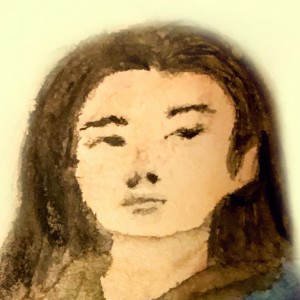There is a story from long ago about a widower who'd lost his wife.
They say she died in a landslide while she was going to gather mushrooms. Unable to escape the crumbling mountain, she was buried alive under the debris. They never found her body, leaving her husband trapped in perpetual grief.
Since then the widower kept to himself. He rebuilt his house and set up a grave marker in his backyard for his wife. He would care for the stone, clearing away weeds and sweeping the space around it. If you walked by his house you'd be able to see him sitting on the veranda, sipping sake* and gazing longingly toward the grave.
Now, the villagers tried to help him through his grief. They bought him gifts of sake and sweets and offered prayers for his wife's soul. The man's closest friends stayed with him some nights, partially afraid that he would run away to join his wife.
While their company was welcomed, the widower remained in his darkness. There came a point when the villagers began to worry about his well-being. Several years after the man had lost his wife he remained isolated from the village. His friends still made periodic visits to the house. At first it was out of pity, but gradually they were check-ins to see if he was still alive.
When they came the widower would not speak to them unless they spoke first. He would not answer the door himself, only grumble from inside that he cared not if they entered. He could be found seated by the hearth or on the veranda, staring blankly toward his wife's grave. Usually he held a cup of sake in hand, and though he remained pale from not going outside, his cheeks were rosy from drunkenness so he would not have to face his grief.
He had truly loved her ever since they were young. He had vowed to marry her when they came of age, and that they would raise a family together. Since she had died shortly after marriage the vow remained unfulfilled. The loss of what could have been seemed too great for the man to bear.
Over time the villagers suggested that the man remarry, or at least leave his house. They begged that he at least join in the planting or harvesting of the crops. They truly feared that this grief would swallow him until there was nothing left.
But the widower refused, sometimes lashing out at them to leave. He wanted nothing to do with the outside world, almost as though he would rather wallow away in sorrow than move forward.
This continued for five years until one particular winter.
I'm told that one midwinter night the widower settled down by the sunken hearth and opened a bottle of sake to drink alone.
There came a knock at the door, and the man lifted his head, weakly calling out, "Who?"
It was said that an old man had knocked that night, a kind-looking fellow wearing a thick straw coat. He opened the door and stepped into the house, asking of the widower, "Have you anything an old man can drink to warm himself up?"
The widower, slightly stunned that the stranger would just walk into his home, got up and closed the door. Dumbfounded, he watched as the old man sat himself down by the fire. The elder removed his coat and smiled to the widower. "Quickly, now. We don't have all night."
The widower found himself offering the old man some sake. He apologized that he hadn't much else to offer, since most days that was all he had.
The old man was undeterred by this fact, and waited patiently as the widower poured his cup.
One can only imagine how nice it felt to receive good sake on a cold night like that. The old man's face was soon rosy and his body warm. He asked for cup after cup, which the widower gave without questioning. The two of them drank, finishing an entire bottle before midnight.
It's unknown what exactly the elder and the widower spoke of, but by morning the old fellow was gone. He'd taken off before dawn, taking his straw coat and leaving the widower sound asleep by the hearth.
Since that night the widower began to venture out of his home, and not just to buy sake. He left his house to visit his friends, remaining quiet at first, but then slowly opening up to the world.
His cold demeanour seemed to melt with the arrival of spring. It was said that he smiled and began to laugh. He partook in the planting of early spring crops, took walks with his friends, and joined them for evening meals.
Of course, the villagers asked what had come over the widower. What had changed to make him so happy now?
The widower himself hardly knew what had happened, and if he did he did not speak it aloud. He only recalled to his friends that an old man had visited in the depths of winter. He and the elder had drunk sake together, sharing stories and laughs until he'd fallen asleep.
But when asked what exactly was shared the widower went silent. He smiled and shook his head like it was a secret. However, he did say he would like to help others like the old man had helped him.
Whatever had transpired that night, the villagers were glad that their neighbour had rejoined the living. They hoped to meet the man who had helped their friend move past his grief. Of course, the old man never visited the village again, but there are similar stories of him throughout the region.
It is said that on lonely nights he will knock on your door and ask to drink sake with you. Then the two of you will drink together like old friends, and by morning he will have left, taking with him all of your sorrows and grief.












Comments (0)
See all